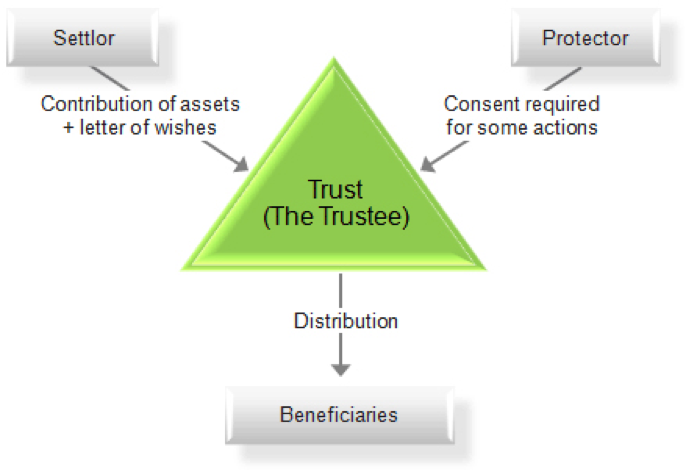Bahamians are fortunate to be born in a country with robust trust legislature for estate and family planning.
For many years trusts have remained a coveted wealth management tool offered by the Bahamas to the international community. Few other structures and arrangements are able to reliably and predictably ensure that an individual’s wishes are fulfilled during and after one’s lifetime, while also respecting confidentiality and protecting assets. These three characteristics of a trust make for an enduring personal estate plan that assists with securing one’s legacy for future generations. As life is unpredictable, it is prudent to have a carefully designed estate plan established with the assistance of experienced professionals.
In summary, a trust is a relationship between the settlor (contributor of the assets), the trustee (the legal owner of the assets) and beneficiaries (those who will benefit from the trust); there may also be a protector (who ensures that the trustee is carrying out their function as intended by the settlor). The diagram below provides a snapshot of how this relationship works:

Some of the uses for setting up a trust include but are not limited to:
- Estate and succession planning;
- Asset protection;
- Maintaining privacy;
- Avoiding probate;
- Charitable giving;
If you own any asset which you do not intend to transfer outright to an individual or group of individuals, then you should consider setting up a trust to hold that asset and similarly classified assets.
As a leading bank & trust company and authorized agent of the Central Bank of The Bahamas, Equity Bank And Trust (“Equity”) is proud to extend to Bahamians the same range of trust services that it has extended to the international community during its more than 32 years in operation. Building on our years of experience as trust and estate practitioners, Equity is able to assist you with your estate planning and wealth management needs.
Having a professional trustee ensures:
- Business continuity;
- Competent employees;
- Licensed and well-regulated conduct;
Below is a background on the history of trusts:
As far back as the twelfth century in England, the trust arose as a solution to a broiling issue of crusaders on voyages transferring ownership of their land to persons in their absence for them to manage their estates and to both receive benefits from and keep up with responsibilities to the state with respect to feudal duties. A feudal system often involves land being granted in exchange for military and other ongoing duties. The rule of law (based on English Common Law derived in part from Roman Law) at the time was that property is an “indivisible entity” and hence whoever held title bore all responsibility, benefits and debts with respect to the property at hand. Upon return from the crusades the crusaders (former landowners) would request of the persons to which title was conveyed for safe-keeping purposes to transfer the land back to them, and at times this request would be denied, leading to a court matter. It became commonplace that these complaints from the crusaders would be raised within the equity courts known as the Court of Chancery, responsible for determining matters of fairness with respect to guardianship, estate and land law, and thankfully, the Court of Chancery would each time rule in the favor of the crusaders. In such cases then, the fiduciary overseer of the property would convey it back to the landowner upon request. This outcome was popularized under the term “use of land” and later as a “trust”.
In the most simplistic terms, the landowner in the trust scenario aforementioned would be the beneficiary, being the entity with beneficial ownership of the asset which was settled into trust by the landowner. The landowner is also a “settlor” or “grantor” in this example since he placed the asset in trust with an overseer, whom is the trustee. The trustee is responsible for the administration of the estate and handling of requests of the beneficiaries guided by the original wishes put in place. A settlor may be an individual or a corporation. The initial wishes presented by the settlor is captured in what is known as a Letter of Wishes which assists the trustee with interpreting the spirit and intent of the legalese contained within a Trust Deed, which governs the trustee, settlor, beneficiary relationship, and the transfer of legal ownership to beneficial ownership. It should be noted that the Letter of Wishes is not legally binding on the trustee but provides the trustee with the intent of the settlor.
While there are certainly a number of possibilities in the construction of a trust, its usefulness in responsible estate planning can be invaluable and offers tremendous peace of mind for continuing the legacy of many hard-working Bahamians. Equity welcomes the discussion and prospect of assisting prospective and existing clients with their trust needs.







